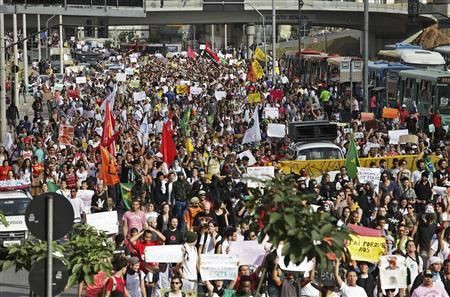Massive Protests In Brazil Over Tax Burden Coupled With Poor Public Services

Tens of thousands of people marched the streets of Brazil on Monday in a nationwide protest to express their frustration over corruption and poor public services despite heavy taxes, even as the BRIC nation is dealing with a slowing economy.
Cities of Rio de Janeiro, Sao Paulo, Brasilia, Belem, Belo Horizonte and Salvador saw major demonstrations, which were by and large peaceful, with people drumming samba rhythms, and dancing and chanting protest jingles.
“We don't have good schools for our kids. Our hospitals are in awful shape. Corruption is rife. These protests will make history and wake our politicians up to the fact that we're not taking it anymore!” a protester, Maria Claudia Cardoso, told Associated Press on a Sao Paulo avenue, who joined the march with her 16-year-old son, Fernando.
“We're massacred by the government's taxes,” she said, adding: “This is a communal cry saying: ‘We're not satisfied.’”
As Brazil prepares to host the 2014 World Cup soccer tournament and the 2016 Olympics, there is a growing sense of disillusionment among its citizens, who complain that billions of dollars in public money have been spent on new stadiums, while public education, health, security and transportation are in a shambles.
In Sao Paulo, at least 65,000 protesters converged at a plaza, before breaking into three separate rallies to protest last week’s 10-cent hike in bus and subway fares -- the original cause that triggered the anti-government protests.
By Monday afternoon, the focal point of the protests shifted to Rio, as the crowds grew to include about 100,000 people, Reuters reported, citing local police. Some 20,000 people took to the streets in Belo Horizonte, the report said.
Clashes were reported near Rio’s legislative assembly, where police used tear gas and fired rubber bullets to stop a group of protesters from invading the building. At least one car was torched and windowpanes of the notary and bank buildings were smashed, according to the Guardian.
Protesters also destroyed property in the southern city of Porto Alegre, Reuters reported.
In the capital, Brasilia, protesters staged peaceful rallies marching to the congressional building, and although some windows of the building were broken, the police did not use force to contain the demonstrators.
The protests followed the weekend’s opening soccer games of the Confederations Cup tournament, and come one month ahead of a papal visit.
Brazil’s President Dilma Rousseff, who is seeking re-election next year, termed the protests “legitimate,” adding that they were “part of democracy,” Reuters reported, quoting the president’s spokeswoman.
Although the country’s unemployment rates are at record lows, the government has been facing inflation and slowing growth. Earlier this month, rating agency Standard & Poor’s lowered its outlook on Brazil’s sovereign debt rating to ‘negative’ from ‘stable’ citing a protracted slowdown in economic growth, while the World Bank cut its forecast on Brazil’s growth in 2013 to 2.9 percent from 3.4 percent.
© Copyright IBTimes 2024. All rights reserved.





















